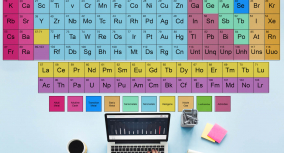Academic probation is a period of academic evaluation where a student’s performance falls below the expected educational standard. Going through academic probation is not the apocalypse, even though it may initially feel like it.
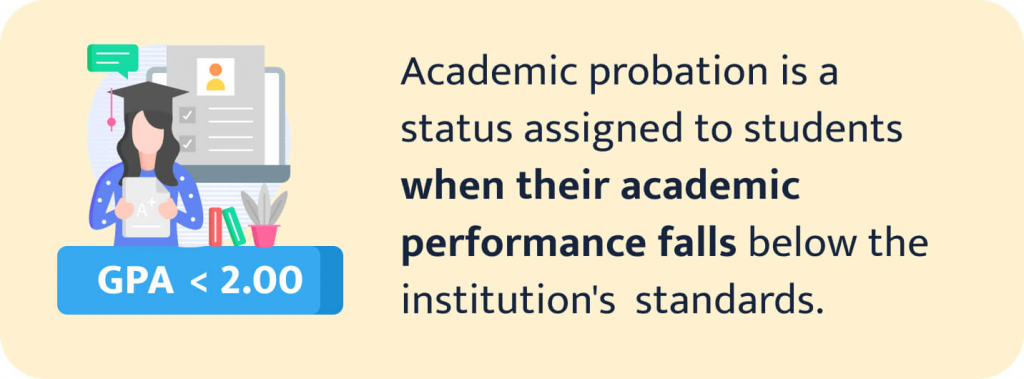
Academic probation serves as a wake-up call, prompting us to reevaluate our approach to studying and learning. It can be an opportunity to identify the areas where we need to improve and develop new strategies to succeed academically. Everyone faces obstacles during their educational journey, and academic probation is just one of them.
In this article, we will explore how to navigate academic probation, find support, and regain confidence in your abilities. We will provide guidance and tips to remind you that setbacks are a natural part of life. ;
❓ What Is Academic Probation? FAQ
Academic probation is a period given to students in a college or university to improve their academic performance when it dips below a certain standard. It serves as a warning that their academic progress is inadequate and requires enhancement. During academic probation, students must take steps to resolve their academic deficiencies.
Academic probation can occur when students have low grades (usually a GPA lower than 2.0), fail to meet the prerequisites for their program, or make unsatisfactory progress toward their degree requirements. It’s important to note that the specific criteria and procedures for academic probation may vary between institutions. You should refer to your school’s educational policies and guidelines for accurate information.
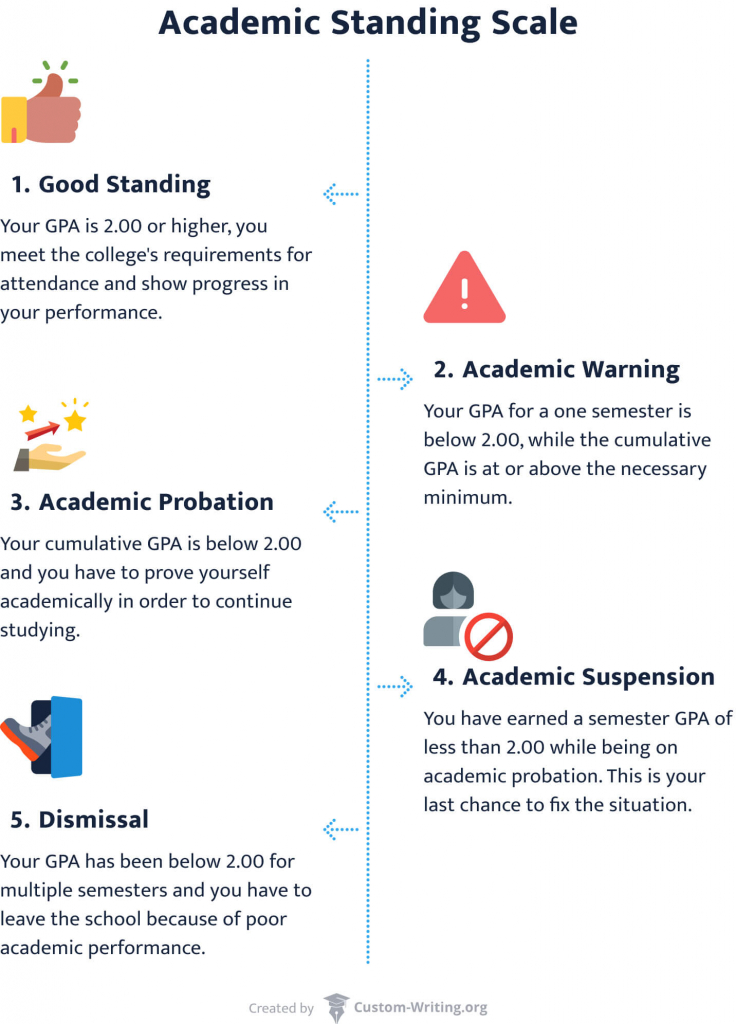
The terms “academic warning,” “suspension,” and “dismissal” are closely related to academic probation; however, each signifies a different level of severity in terms of academic standing:
- Academic warning. This is the initial stage of official notice, indicating to students that their academic performance is below the expected level. After this caution, students can improve their performance without severe consequences.
- Academic suspension. Students who fail to make satisfactory progress during the probationary period may face academic suspension. Students are not allowed to take courses or participate in educational activities at the institution during this time.
- Academic dismissal. Academic dismissal is the most severe consequence of poor academic performance. It signifies a complete separation from the educational institution. Students can no longer continue their studies at the institution.
How Long Does Academic Probation Last?
Typically, academic probation lasts for 1-2 semesters. However, it is essential to note that the specific length of probation is determined by the institution’s policies and the progress made by the student in improving their academic performance. Students should refer to their institution’s guidelines for accurate information on the duration of academic probation.
What GPA Puts You on Academic Probation?
Generally, academic probation is triggered when a student’s GPA falls below a specific minimum requirement, often around 2.0 on a 4.0 scale. Keep in mind that the particular GPA criteria for academic probation can differ depending on the school’s policies and regulations.
Does Academic Probation Stay on Your Record?
Some colleges only note academic probation on unofficial transcripts. However, others may make a permanent comment on students’ academic records. If your academic probation is recorded on your transcript, it will only have serious consequences if you don’t return to good academic standing.
How Can You Get off Academic Probation?
Students should show academic progress to be removed from academic probation, which typically involves improving their GPA. It’s essential to take responsibility for academic performance and make an improvement plan. This can include attending office hours, creating a study schedule, seeking tutoring or educational support services, and actively participating in class. Consistent effort and dedication are key to getting off academic probation.
How Many Times Can You Be on Academic Probation?
The number of times a student can be on academic probation varies by institution. Some schools may have a limit on the number of times a student can be on probation, while others may not have a limit. It’s important to check your school’s policies and work towards improving your academic performance to avoid being on probation multiple times.
Does Academic Probation Affect Financial Aid?
Yes, academic probation can affect financial aid. Students on academic probation may not be eligible for certain types of financial aid, such as scholarships or grants, because their GPA should be above 2.0. Additionally, if students’ grades do not improve and they are placed on academic suspension, they may lose their financial aid altogether.
🤔 Reasons for College Probation – Who Is at Risk
There are various reasons why a student may be placed on college probation. However, if you know these reasons, you can minimize the risks.
These are the common factors that can contribute to a student’s probationary status:
Other Prerequisites
Life is unpredictable, and many things can cause the risk of academic probation. These factors can worsen your academic performance and, as a result, lead to probation:
- Poor time management and organization skills;
- Bad study habits or lack of motivation to learn;
- Distractions and difficulty to focus in class;
- Struggles with understanding course material or completing assignments;
- Poor communication skills or struggle with group work;
- Personal issues or challenges that affect academic performance;
- Tendency to engage in risky behaviors or use drugs and alcohol excessively;
- History of disciplinary problems or rule-breaking behavior;
- Lack of support from family or friends and feelings of isolation or being overwhelmed;
- Learning disabilities or mental health conditions that affect academic performance;
- Long hours at work or other responsibilities outside of school;
- Struggles with test anxiety or other forms of performance anxiety;
- Lack of interest in the chosen field of study or career path;
- Relationship problems or other personal issues affecting the ability to focus on studies.
🙅 How to Prevent Academic Probation
Usually, before you’re put on probation, you’ll get an academic warning from your college administration. Academic warnings shouldn’t be viewed as menacing but rather as a call for action.
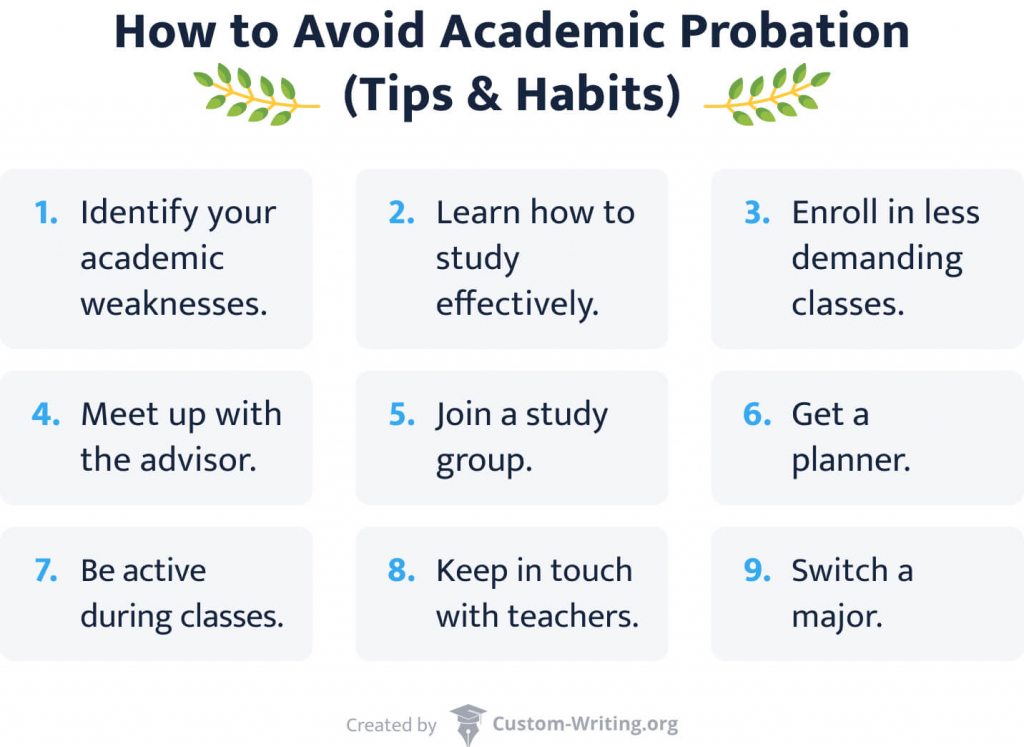
Here are some strategies for avoiding the more severe consequences of academic probation after getting a warning:
- Recognize your academic weaknesses. Take a realistic look at your academic performance. Review your grades, assignments, and feedback from previous semesters or courses. Identify the subjects or study habits that are causing you to struggle and make note of them.
- Get a planner. Use a planner or a digital calendar to manage your time effectively. This will help you keep track of important deadlines, exams, assignments, and classes.
- Schedule appointments with an advisor. Regularly meet with your academic advisor to discuss your progress and get guidance on course selection. They can provide valuable insights and help you develop a plan to improve your grades.
- Ask for help. Don’t hesitate to ask for help when you need it. Contact your professors, teaching assistants, or tutoring services for additional support. They can provide clarification on complex concepts and offer study resources.
- Consider switching majors. If you consistently struggle in a specific major or field of study, it may be worth considering switching to a different academic program. Explore your options and choose a major that aligns better with your strengths and interests.
- Enroll in less demanding courses. If your current course load is overwhelming, consider enrolling in less challenging courses for a semester. This will give you more time to focus on improving your study habits and academic performance.
- Learn how to study effectively. Adopt effective study techniques such as setting specific goals, breaking down tasks into smaller manageable chunks, using mnemonic devices, creating study notes, and reviewing material regularly.
- Join a study group. Collaborating with classmates can help you actively learn and improve your understanding of the course material. Join or form a study group to discuss concepts and support each other in your academic journey.
- Get in contact with professors. Develop a professional relationship with your professors by attending their office hours or emailing them. Don’t be afraid to demonstrate your commitment and ask for additional assignments that may help raise your grades.
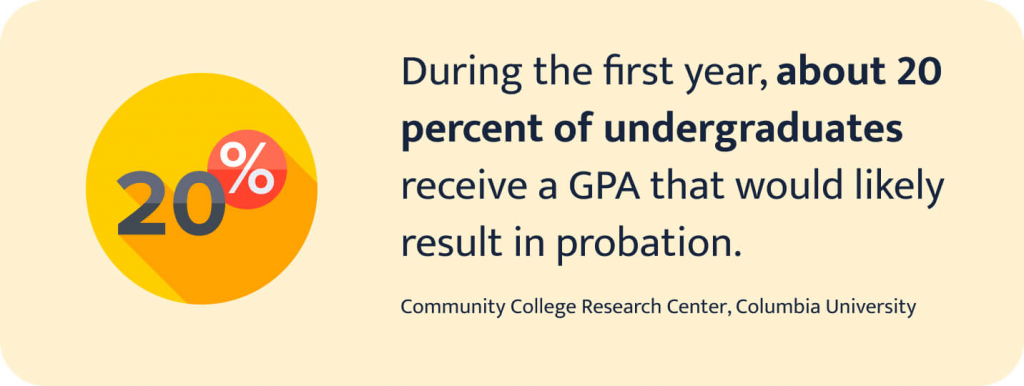
📌 Probation Action Plan – What to Do
In this section, we’ll explore the main stages of the academic probation procedure. Read this section attentively to know what to expect from the process. However, note that the specific details and requirements of the procedure can differ among colleges and universities. It’s best to check the information on your school’s official website.
Academic Probation Procedure
1️⃣ Academic warning. Students receive a notification or alert regarding their unsatisfactory academic performance; for example, their GPA falls below 2.0.
2️⃣ Meeting with the advisor. A student meets with an academic advisor to discuss their current situation, review their academic progress, and explore strategies for improvement.
3️⃣ Academic probation. If the student fails to make adequate progress, they may be placed on academic probation, which typically comes with additional restrictions or requirements.
4️⃣ Probationary period. The student is given a specific time frame to improve their academic performance significantly. On average, the academic probation period may last for 1-2 semesters.
5️⃣ Consequences. If the student cannot meet the required standards or make satisfactory progress during probation, they might face suspension or dismissal from the college.
Steps to Get off Probation
If you find yourself on academic probation, it can feel like an overwhelming experience. However, it’s important to remember that the university is there to help you. It will typically offer resources such as academic advising, tutoring services, and academic support centers to help you get back on track.
Here is some of the best advice for getting off academic probation:

🚀 Make It Work for You – Benefits of Probation
Did you know that according to the National Center for Educational Statistics, 8.24% of graduates have been on academic probation at least once? Such an experience didn’t stop them from successfully graduating and probably even brought them some benefits.
Now,
We want you to focus on the bright side of probation. These benefits might help you gain a new perspective:
- Increased motivation. Being on academic probation can be a wake-up call if you’re struggling to take your studies seriously. This experience can help you to overcome your procrastination.
- Access to resources. Many colleges and universities offer academic support services to students on probation, such as tutoring, study groups, and academic coaching. These resources can help improve your study skills in the long run.
- Better focus. While on probation, you must focus more on your studies and prioritize your academic responsibilities. This is an opportunity to learn how to deal with distractions more efficiently and improve your concentration.
- Improved time management skills. Students on probation often need to reassess their time management skills and develop better study habits. Improving your self-management skills will benefit your academic and professional career.
- Personal growth. Overcoming academic challenges is a powerful learning experience that can help you develop resilience, perseverance, and self-discipline.
- Increased accountability. Being on probation means that you are held accountable for your academic performance. This can bring a greater sense of ownership of your life and success.
- Career preparation. Getting off academic probation allows you to acquire important skills highly valued by employers, such as problem-solving and critical thinking. No matter what career path you choose, these skills will be helpful.
- Personal satisfaction. Surviving academic probation and improving your grades can be a source of pride and personal satisfaction. This can help you feel more confident and motivated to work towards your most ambitious goals.
- Opportunity for self-reflection. Being on probation can allow you to reflect on your major, academic goals, and values. You can gain valuable insights into your priorities, which can guide your future academic and career choices.
↪️ Recap & Final Tips
Many students feel “embarrassed,” “ashamed,” and “sad” for being put on academic probation. These feelings may occur when students view academic probation as the end of the road. But what if we take a different perspective and see it as an opportunity to learn and grow from mistakes and challenges?
Many scary myths surround academic probation, but here’s what you need to know:
- Typically, academic probation only lasts for 1-2 semesters.
- Academic probation only has serious consequences if you don’t get back in good academic standing.
- You can get off academic probation if you show academic progress and improve your GPA.
By taking advantage of the resources and support available at your school, you can turn academic probation into a positive experience that helps you gain a better understanding of your academic strengths and weaknesses. You also get to develop essential life skills such as time management, goal setting, and self-reflection.
Remember, academic probation is not a reflection of your worth or potential. It is simply a temporary setback that you can overcome with determination and hard work. Use this experience as motivation to strive for excellence and reach your full potential.
🧷 References
- How to fix problems with academic probation (opinion)
- Academic Probation and Dismissal – BMCC
- Academic Warning, Probation, Suspension, and Dismissal | One Stop – Miami University
- Frequently Asked Questions about Academic Probation- Advising Central
- What to Do If You’re Placed on Academic Probation: ThoughtCo
- University Academic Probation – Academic Advising | University of South Carolina
- Academic Probation: How to Avoid it & Cope | Everyday Power
- Administrator & Student Perspectives on Academic Standing – College Transition Collaborative




![How to Organize a Successful Study Group [GUIDE]](https://custom-writing.org/blog/wp-content/uploads/2023/04/doing-homework-together-1-284x153.jpg)
![The Scaffolding Technique in Education: Benefits & Examples [Is It Really Useful?]](https://custom-writing.org/blog/wp-content/uploads/2023/03/business-women-signature-document-1-284x153.jpg)





